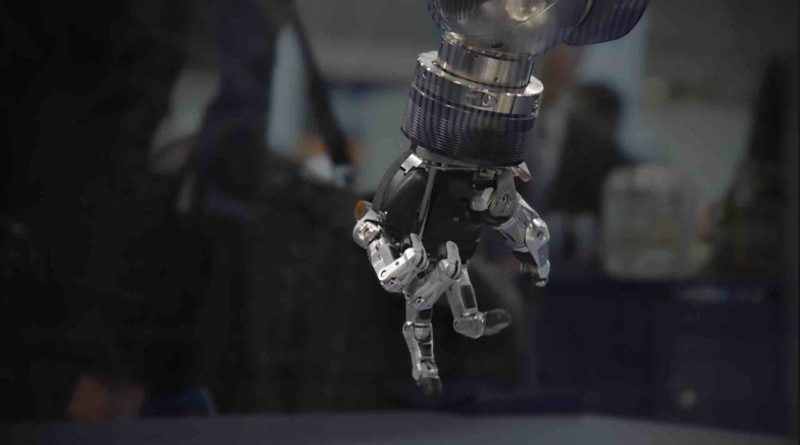INTERVIEW: HBO explores deeper consequences of ‘Killer Robots’
Photo: The Truth About Killer Robots looks at the societal, psychological and philosophical perils of automation. Photo courtesy of HBO / Provided by Susan Norget PR with permission.
The Truth About Killer Robots is a new HBO documentary that looks at the societal, psychological and philosophical concerns of automation and robotics in a hyper-technological world. Premiering Monday, Nov. 26 at 10 p.m., the film takes a wholly unique approach to the idea of robotics. This is not about Terminator-esque world takeover or space travel; the dramas on display are of a more personal nature, ending in great loss and deep questions.
The film is the brainchild of Maxim Pozdorovkin, a director who has teamed up with HBO on several projects.
“I’ve been thinking about trying to make a film about automation for a long time because it’s this large, transformative force in society, but for a long time I couldn’t figure out how to do it,” he said in a recent phone interview. “I heard about this incident where a manipulator arm at the Volkswagen factory killed a worker who was kind of installing it. I went there, and I talked to the workers.”
Many of the employees declined the interview opportunity with Pozdorovkin, but the director was not discouraged. He kept exploring this case study and others where automation transfigured a populace and sometimes the consequences turned deadly. He was after a two-pronged approach.
“I saw this coming together, this opportunity to make a film that would be about automation as a cause of literal death, but as a way of thinking about automation as a metaphorical death,” he said. “When I was starting to make this film, I read lots of books about the subject. I watched all the movies and all the documentaries on it and all the news pieces done on it. I was amazed. I kept seeing all these blind spots, and the main one was that almost all of the voices in these books and in these pieces were of the people — the technologists, the CEOs, people who were profiting from the technology directly. And therefore all the material had this kind of underlying marketing premise of what can robots do for us and for you. For me, the interesting question, and the question was unexplored as a huge blind spot, was what robots were doing to us.”
Pozdorovkin wanted to document the transformation of society. He also did not want to characterize artificial intelligence as a possibility of the future, some development that may or may not happen. Speculative sci-fi has been done time and time again; he wanted immediacy and an almost academic approach to the topic.
“To grapple with what robots and auto-technology does to us, it’s really useful to think about AI not as something that we’re heading toward, but as a continuation of automation, as something that started in the ’70s or even farther back and continues in a way and is spreading,” he said. “[I saw that] as part of that process rather than something that is separate and in our future.”
The film is structured around three case studies in which a person died while interacting with robotic technology. Besides the Volkswagen death in Germany, there is evidence presented about driverless cars and robots being used by the Dallas Police Department after a gunman killed several law-enforcement officials. However, the bulk of the documentary extends beyond the deaths and instead focuses on this idea of automation.
“The whole film is about automation,” the filmmaker said. “From the beginning I knew that I wanted to have the film have the look of a dystopian true crime sci-fi, but in that guise use that device to grapple with issues like structural labor economics. … So with manufacturing, it was a workforce being gradually pushed out through advances in precision manufacturing, and I saw that come out of a lot of the conversations that we were having with the workers.”
Pozdorovkin’s focus on the service sector focuses on a death in a self-driving Tesla, one that made many headlines a couple of years ago.
“That section begins with the phrase, ‘Automation of the service sector requires your trust and cooperation,’ and what we see with automation of the service sector is precisely that we’re gradually adapting,” he said. “We’re becoming much more dependent on all the types of technology, and that has all these other steps that I want to explore, things like broad de-skilling and our loss of any sense of dignity from a lot of labor that people perform, loss of spatial orientation, loss of memory, all these qualitative things that a lot of times get thrown by the wayside when we’re thinking only quantitatively in terms of advances, in terms of productivity gains, etc.”
In Pozdorovkin’s research, he kept noticing there are few interviews of the actual people and communities who are impacted by advances in automation. If a hotel turns to automated checkin and concierge services (one example in the film), what does that mean for the hotel workers? If robots on wheels can deliver mail quicker and more efficiently than humans, what about the mail sorters? If a man from China marries a robot woman (another example in the film), what does that say about the development of human relationships and the view of women in society?
“Clearly the people who are most directly threatened by this, by the depth of this technology, not a single report bothered to speak to them,” Pozdorovkin said. “A lot of the other moral, philosophical, psychological things start to come out. … We have to start to think about what the lived experiences are of a lot of the people that are going through this and adapting to this technology.”
By John Soltes / Publisher / John@HollywoodSoapbox.com
The Truth About Killer Robots, directed Maxim Pozdorovkin, premieres Monday, Nov. 26 at 10 p.m. on HBO. Click here for more information.

